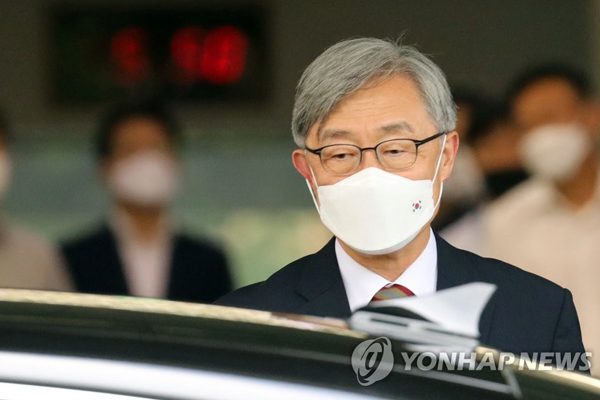Choe Jae-hyeong, head of the South Korean Board of Audit and Inspection (BAI), announced Monday that he is stepping down from his post amid rampant speculation that he will be seeking the conservative presidential nomination. The fact that the BAI head, who is usually an unassuming bureaucrat, is thinking of running for president reveals the deep scandals that have affected many parts of the Moon administration.
President Moon Jae-in accepted Choe’s resignation on the same day. It was reported that Moon expressed regret that Choe was setting an undesirable precedent by leaving office over his political ambitions, even though the four-year tenure of the BAI chairman was established to guarantee the agency’s political neutrality.
“I concluded that it is inappropriate for me to continue serving as the chairman of the Board of Audit and Inspection amid growing speculation about my fate,” Choe told reporters on Monday. “I, therefore, expressed my intention to step down to the president.”
When asked if he plans to run in the March 2022 presidential election, Choe said, “I will have an opportunity in the future to talk about it.”
Choe, a 64-year-old former judge, has emerged as a possible presidential contender for the opposition People Power Party (PPP). The BAI announced last year that the Moon administration’s shut down of the Wolsong Unit 1 nuclear reactor based on a manipulated economic assessment report was premature. The ruling Democratic Party (DP) has attacked Choe and the BAI for undermining the legitimacy of Moon’s so-called nuclear phase-out policy.
Choe is the second top official from the Moon administration to resign for a possible presidential run in the opposition camp. The first was former Prosecutor General Yoon Seok-youl, who resigned in March. He stepped down after conflict with the administration over the president’s plans to weaken the state prosecution service under the name of reform and Yoon’s investigations into high-profile Moon allies. Yoon is currently the opposition’s presidential front-runner.
Choe’s potential presidential ambitions reveal just how angry the public is over the Moon Jae-in administration’s deceptive nuclear energy policy. Currently, officials involved in implementing the nuclear phase-out policy are being investigated by prosecutors, but doubts remain over whether those investigations will be interfered with by supporters of Moon in the prosecution.
The Daejeon District Prosecutor’s Office announced that its senior officials held a meeting last week and decided to indict former Trade Minister Paik Un-gyu, former presidential secretary for energy policy Chae Hee-bong, and Korea Hydro & Nuclear Power (KHNP) CEO Chung Jae-hoon for manipulating the economic feasibility study of the Wolsong Unit 1 reactor. They face charges of abusing their authority and malfeasance in office.
In order to prematurely shut down the Wolsong Unit 1 nuclear reactor, the country’s sole nuclear power company KHNP was forced by the Ministry of Trade, Industry and Energy to submit misleading reports on the reactor’s economic feasibility.
KHNP requested that a domestic accounting firm conduct the economic feasibility study. At first, the accounting firm provided a report by setting the reactor’s capacity factor at 85 percent. A month later, the firm lowered it to 70 percent after consulting with the trade ministry and KHNP. However, it still showed that the profit from operating the plant would be 177.8 billion won when compared to shutting it down right away.
The accounting firm was told to lower the capacity factor to 60 percent, but it still stated the profit was 22.4 billion won. The final results showed that it was more profitable to continue its operation. Despite this, KHNP concluded that it was better to shut it down.
The Daejeon District Prosecutor’s Office believes that senior officials including Paik, Chae, and Chung manipulated the economic feasibility study to prematurely shut down the Wolsong Unit 1 reactor and that this decision caused damage to the Korea Electric Power Corporation, which is the managing body of KHNP.
It is unclear whether the Daejeon District Prosecutor’s Office’s investigation will be approved by the Supreme Prosecutor’s Office, which is headed by Moon loyalists. Other investigations related to the scandal have been hushed by the prosecution before.
Previously, the main prosecution office failed to investigate Paik, Chae, and Chung thoroughly. Instead, the Seoul Central District Prosecutors’ Office was also criticized in the past for investigating Choe Jae-hyeong for aggressively auditing the nuclear scandal to make it look like the decision was made illegally. The auditing agency submitted a 7,000-page investigation report to the prosecution saying that the economic feasibility of Wolsung Unit 1 was manipulated in October. Some environmental organizations filed a lawsuit against Choe arguing that he investigated people to attack the Moon Jae-in administration’s nuclear phase-out policy.


